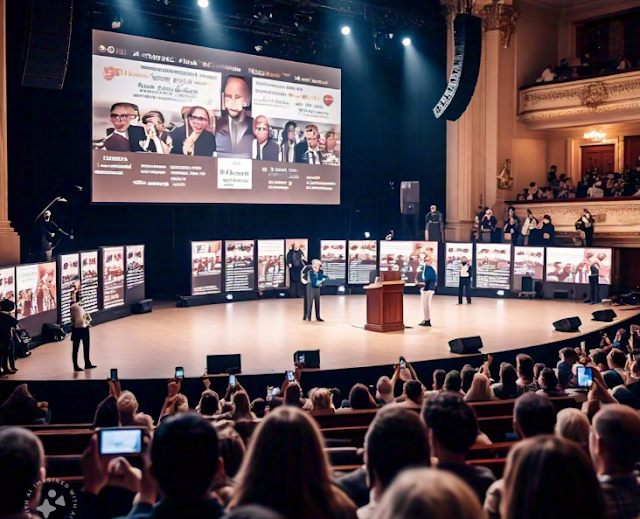
In today’s digital age, the role of social media in
political campaigns has become more crucial than ever.
With billions of users globally, platforms like Facebook,
Twitter, Instagram, and TikTok are not just tools for connecting with friends
and family, but also vital for politicians and political movements to engage
with voters, shape public opinion, and spread campaign messages.
The influence of social media in political campaigns
continues to grow, transforming the way politicians communicate with the
public, strategize their messages, and ultimately, influence election results.
In this article, we will discuss how social media has
reshaped political campaigns, its benefits and challenges, and the ethical
considerations that come with its widespread use.
The Power of Social Media in Political Campaigns
Social media platforms have democratized information
sharing, providing a direct line of communication between politicians and their
supporters.
Before the rise of social media, political campaigns relied
heavily on traditional media outlets like television, radio, and newspapers to
communicate with voters.
While these methods are still effective, social media has
introduced a more interactive and real-time way to connect with voters.
Politicians can now post updates, answer questions, and respond to current
events almost instantaneously.
RELATED: The Role of Political Movements in Shaping the 20th-Century Political Landscape
The role of social media in political campaigns is not just
about reaching more people but also about engaging them in conversations.
Voters can directly interact with candidates, ask questions,
and even contribute to policy discussions. This level of engagement helps to
create a sense of community around a political campaign, making it easier for
candidates to build a loyal following.
Social Media as a Tool for Targeted Messaging
One of the most significant advantages of using social media
in political campaigns is the ability to target specific demographics with
tailored messages.
Through data analytics, political campaigns can gather vast
amounts of information about voters, including their age, location, interests,
and even voting history.
This data allows campaigns to create highly
personalized advertisements that are more likely to resonate with different
segments of the population.
For example, a political campaign can target younger voters
on Instagram with content related to issues such as climate change, social
justice, and student loan reform.
At the same time, they may choose to focus on
older demographics on Facebook, with messages addressing healthcare and
retirement security.
This level of precision in messaging was unimaginable in
the days of traditional media, where political ads had to be more generalized
to appeal to broader audiences.
RELATED: Impact of the Cold War on Global Political Alliances and Conflicts
Moreover, the affordability and reach of social media ads
make them a powerful tool for political campaigns with limited budgets.
While
buying TV ads can be costly, social media advertising offers a more affordable
option for reaching large audiences.
This has leveled the playing field,
allowing smaller candidates or grassroots movements to compete more effectively
against wealthier opponents.
The Dark Side: Misinformation and Manipulation
While social media offers many benefits to political
campaigns, it also comes with significant risks.
One of the most pressing
concerns is the spread of misinformation. In recent elections, there have been
numerous instances of false or misleading information being shared widely on
social media, which can have a damaging effect on public opinion.
RELATED: Impact of Electoral Reform on Voter Turnout
From deepfake
videos to fake news stories, the ability to manipulate information has made it
harder for voters to discern fact from fiction.
Political campaigns can also use social media to manipulate
voters by spreading divisive or inflammatory content that appeals to people’s
emotions rather than their reason.
This tactic, known as “emotional
campaigning,” has become more prevalent as candidates seek to rally their
base and discredit their opponents.
Unfortunately, such strategies can deepen
political polarization and make it harder for voters to engage in meaningful
discussions about policy.
The role of social media in political campaigns also raises
concerns about privacy. Many political campaigns use personal data to target
voters with customized ads, but the collection and use of this data can
sometimes cross ethical boundaries.
The Facebook-Cambridge Analytica scandal,
in which personal data from millions of Facebook users was harvested without
consent, highlighted the potential dangers of using social media data for
political manipulation.
RELATED: Minor Political Figures of the 20th Century
Ensuring that personal data is protected and used ethically
is an ongoing challenge for both social media platforms and political
campaigns.
The Role of Social Media in Activism and Grassroots
Movements
Social media’s influence on political campaigns extends
beyond traditional elections. Social media has also played a key role in
facilitating activism and grassroots movements.
Platforms like Twitter and
Facebook have been instrumental in organizing protests, raising awareness about
social issues, and holding politicians accountable.
For instance, movements like #MeToo and Black Lives Matter
gained significant traction through social media, mobilizing millions of people
around the world to advocate for social justice and political change.
The
ability to share information and organize events in real time has empowered
ordinary citizens to challenge the status quo and demand action on issues that
matter to them.
This shift has forced politicians to pay closer attention to
public sentiment on social media, as campaigns are now scrutinized by activists
and citizens alike.
RELATED: Trump Claims It Was His ‘Best Debate Ever’ and Accuses Moderators of Bias
A single viral post or tweet can shift public opinion and
affect the course of a campaign. As a result, political candidates must
carefully manage their social media presence to ensure they are in tune with
the concerns of their constituents.
Conclusion From Politicalvista
The role of social media in political campaigns is
undeniable, and it will only continue to evolve in the coming years.
While
social media offers many benefits, including targeted messaging, real-time
engagement, and a platform for activism, it also presents significant
challenges, such as misinformation, privacy concerns, and the potential for
manipulation.
As social media becomes increasingly central to political
campaigns, it is essential for candidates, voters, and platforms to work
together to ensure that these tools are used responsibly and ethically.
For politicians, social media will remain a key component of
their campaign strategy, providing an opportunity to connect with voters on a
personal level and influence public opinion.
RELATED: Debbie Mucarsel-Powell Victory Speech – Aug. 20, 2024
However, it is crucial for them to
recognize both the power and the responsibility that come with using social
media to shape political discourse.
Voters, too, must remain vigilant,
critically analyzing the information they encounter online and engaging in
thoughtful, informed discussions about the issues that matter most.
As we look to the future, the role of social media in
political campaigns will only grow, and its impact will continue to shape the
political landscape for years to come.

Be the first to comment